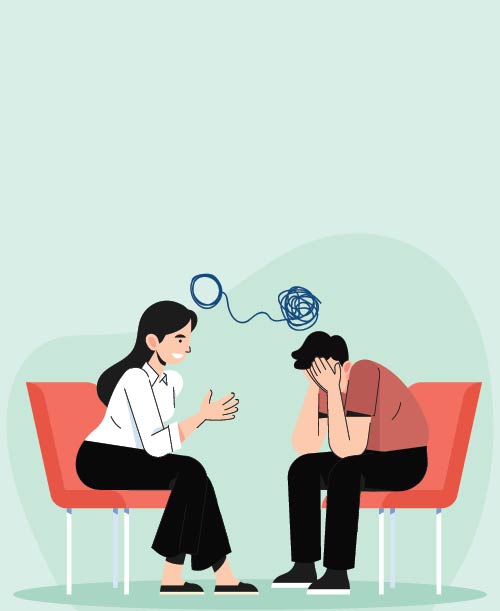Opening the Secrets of Mental Health: An Introduction of Therapy and Treatment Alternatives
Mental health is a complex and critical element of general wellness. Many counseling and therapy alternatives exist to address various emotional difficulties. Each approach offers unique advantages and methods customized to private requirements. Comprehending these alternatives is necessary for any individual seeking to boost their mental health and wellness. Cognitive Behavioural Therapy. What variables should one take into consideration when checking out these opportunities? The response might disclose a course to a healthier emotion
Understanding Mental Wellness and Its Importance
Psychological health includes the psychological, psychological, and social well-being of individuals, substantially influencing just how they think, really feel, and act. Its importance can not be overstated, as it affects every aspect of life, including connections, job performance, and general lifestyle. Individuals with good mental wellness have a tendency to deal with anxiety better, maintain healthier connections, and make notified decisions. Conversely, bad mental health can bring about emotional distress, impaired functioning, and various mental illness, which might require specialist treatment. Understanding mental health is necessary for recognizing the signs of distress and the requirement for support. Understanding likewise promotes compassion and lowers stigma, encouraging people to look for aid when needed. By prioritizing psychological health, communities can promote environments that sustain psychological well-being, eventually bring about much healthier, much more resistant people. This foundation functions as a crucial action towards effective psychological health and wellness counseling and therapy alternatives.
Sorts Of Therapy Strategies
Counseling techniques vary widely, each tailored to satisfy the unique demands of people seeking support. Amongst the most common kinds are cognitive-behavioral treatment (CBT), which concentrates on determining and transforming unfavorable idea patterns, and person-centered therapy, which highlights compassion and approval. Psychodynamic therapy discovers previous experiences and unconscious processes to comprehend current behavior, while solution-focused short treatment aims to identify services rather than examine problems.Additionally, household treatment addresses relational dynamics and interaction within families, promoting healthier communications. Team counseling offers a common area for individuals to share experiences and sustain each other. Other strategies consist of existential therapy, which motivates individuals to find significance and objective, and art or music treatment, which utilizes innovative expression as a healing tool. Each technique provides distinctive techniques and philosophies, enabling clients to discover the most suitable approach for their individual growth and healing trips.
Discovering Various Treatment Techniques
In the domain name of mental wellness therapy, numerous treatment methods provide distinctive methods to therapy. Cognitive Behavior modification highlights the link in between thoughts and habits, while Psychodynamic Therapy checks out unconscious impacts on emotional wellness. Additionally, Mindfulness-Based Techniques advertise present-moment understanding as a way to enhance emotional law and general mental wellness.
Cognitive Behavior Treatment
Cognitive Behavior Treatment (CBT) stands out as one of one of the most commonly exercised and researched techniques in mental wellness treatment. This technique concentrates on the affiliation between feelings, ideas, and actions, stressing that changing negative thought patterns can cause boosted psychological well-being and behavioral modifications. CBT is structured, normally involving a minimal variety of sessions, and aims to furnish people with functional abilities to manage their signs. It works for a range of conditions, including stress and anxiety conditions, clinical depression, and trauma. By using strategies such as cognitive restructuring and exposure treatment, CBT cultivates strength and equips clients to challenge difficulties head-on, making it a useful option in the landscape of psychological wellness treatments.
Psychodynamic Therapy Strategies
Psychodynamic therapy strategies use a deep expedition of the subconscious mind and its influence on behavior and emotional health. Rooted in Freudian concept, these methods highlight the significance of very early childhood experiences and subconscious conflicts. Via strategies such as cost-free association, dream analysis, and transfer, people acquire understanding right into their feelings and thoughts, promoting self-awareness and understanding. This therapeutic method motivates clients to discover repressed feelings and unsolved concerns, which can be crucial in attending to existing psychological challenges. By taking a look at the interplay between present behaviors and past experiences, psychodynamic therapy intends to promote psychological healing and personal development. Ultimately, it offers a structure for people to check out complex internal characteristics that affect their psychological wellness.

Mindfulness-Based Techniques
While traditional therapies usually concentrate on past experiences, mindfulness-based techniques focus on present-moment understanding as a path to emotional well-being. These techniques, including mindfulness-based cognitive therapy (MBCT) and mindfulness-based anxiety reduction (MBSR), motivate people to engage totally with their thoughts and feelings without judgment. Experts learn to observe their psychological states, fostering a higher understanding of psychological triggers and reactions. This technique not only minimizes symptoms of stress and anxiety and anxiety yet additionally enhances overall psychological durability. By integrating mindfulness exercises, such as reflection and deep breathing, clients grow a sense of peace and quality. Ultimately, mindfulness-based methods encourage individuals to browse life's challenges with enhanced understanding and acceptance, promoting a much healthier connection with their ideas and feelings.
The Role of a Specialist or Counselor
An experienced specialist or therapist plays a vital role in supporting people through their psychological health journeys. They provide a secure, non-judgmental room where clients can share their ideas and feelings honestly. Couples Therapy. By utilizing various healing strategies customized to every individual's demands, specialists help customers discover underlying problems that might contribute to their mental wellness challenges.Therapists provide assistance and tools to handle anxiety, stress and anxiety, anxiety, and various other emotional troubles. Their training equips them to recognize patterns in habits and thought processes, assisting in understandings that cause personal growth. They likewise promote a solid therapeutic alliance, which is vital for effective outcomes.Moreover, therapists remain fully commited to confidentiality and moral criteria, making certain a relying on environment. Ultimately, the role of a therapist or therapist is to look at this now empower people, urging them to establish durability and much healthier coping methods while steering with life's complexities
Exactly how to Pick the Right Counseling or Treatment Choice
Choosing the best counseling or therapy option starts with anonymous reviewing individual requirements. It is important to comprehend personal obstacles and objectives before checking out different therapy designs. This fundamental step can significantly affect the performance of the selected approach.
Examine Your Requirements

How can individuals efficiently evaluate their psychological health requires when assessing counseling or therapy options? First, they need to show on their emotion and identify certain concerns, such as depression, anxiousness, or connection difficulties. Journaling can be a useful tool for tracking ideas and feelings gradually. In addition, people may gain from seeking responses from trusted good friends or relative concerning regarded changes in actions or state of mind. It is additionally practical to assess individual goals for treatment, such as enhancing coping abilities or getting insight right into personal patterns. Looking into various therapy methods and their suitability for certain requirements can aid in making an enlightened choice. Eventually, self-awareness plays a critical role in choosing the right path for psychological health and wellness assistance.
Explore Therapy Styles
While passing through the varied landscape of therapy options, individuals ought to consider various designs of counseling to find the very best suitable for their unique needs. Cognitive Behavior Modification (CBT) focuses on transforming unfavorable idea patterns, while Psychodynamic Treatment checks out unconscious processes and previous experiences. Humanistic approaches highlight individual growth and self-actualization, cultivating a supportive atmosphere. In addition, mindfulness-based treatments grow present-moment understanding, assisting psychological guideline. For those looking for structure, Solution-Focused Short Treatment targets details objectives and solutions. Team treatment gives a public setup for shared experiences and support. Inevitably, individuals should certainly review their preferences, comfort levels, and particular obstacles, guaranteeing they pick a healing style that reverberates with their individual trip towards psychological well-being.
Overcoming Obstacles to Looking For Help

The Benefits of Therapy and Therapy for Mental Wellness
Seeking help for mental health difficulties can bring about considerable improvements in general well-being. Counseling and therapy give people with a risk-free room to explore their thoughts and feelings, cultivating self-awareness and personal development. These specialist solutions outfit customers with coping techniques and analytical abilities customized to their unique situations.Moreover, treatment can minimize signs and symptoms of anxiety, clinical depression, and various other psychological wellness conditions, improving psychological strength. Routine sessions advertise accountability and encourage people to set and accomplish personal goals. Via different healing modalities, such as cognitive-behavioral treatment or mindfulness techniques, clients find out to reframe adverse thoughts and establish healthier behaviors.Additionally, the therapeutic connection itself can be a source of support, assisting to battle isolation and solitude. Generally, involving in counseling and treatment is a positive step toward achieving mental health, allowing people to lead more fulfilling lives.
Regularly Asked Concerns
For How Long Does Counseling or Treatment Generally Last?
The period of counseling or therapy varies substantially, usually lasting from a couple of sessions to numerous months or years. Elements affecting this include the individual's particular needs, the sort of treatment, and healing objectives.
What Should I Expect During My First Session?
During the very first session, people can anticipate an introduction, conversation of problems, and the therapist's technique. They might complete assessments and establish goals, fostering a risk-free atmosphere for open communication and structure connection.

Are There Any Type Of Risks Connected With Therapy?
Therapy can involve risks, such as emotional discomfort, vulnerability, or challenging painful memories. While these obstacles might emerge, they can additionally bring about personal development and healing, making the therapeutic process facility yet possibly fulfilling.
Exactly How Can I Inform if My Specialist Is a Good Fit?
Identifying if a therapist is an excellent fit involves examining convenience, interaction design, and therapeutic approach. Positive connection and progress in the direction of objectives are indications of an appropriate suit, crucial for effective mental health and wellness support.
Will My Insurance Coverage Cover Counseling or Therapy Procedure?
Determining insurance coverage for counseling or therapy sessions commonly needs calling the insurance supplier directly. Policies differ significantly, so individuals need to verify benefits, co-pays, and any kind of essential pre-approvals before going after treatment solutions. Amongst the most common types are cognitive-behavioral therapy (CBT), which concentrates on recognizing and transforming unfavorable idea patterns, and person-centered therapy, which emphasizes empathy and acceptance. Psychodynamic therapy discovers previous experiences and subconscious processes to understand current behavior, while solution-focused short therapy aims to identify options rather than examine problems.Additionally, family treatment addresses relational characteristics and interaction within households, fostering much healthier communications. Other methods consist of existential therapy, which motivates people to discover meaning and purpose, and art or songs treatment, which makes use of creative expression as a restorative tool. Cognitive Behavior Treatment stresses the link between ideas and behaviors, while Psychodynamic Treatment checks out subconscious influences on psychological health. Cognitive Behavioral Treatment (CBT) concentrates on altering adverse thought patterns, while Psychodynamic Therapy checks out subconscious processes and previous experiences.